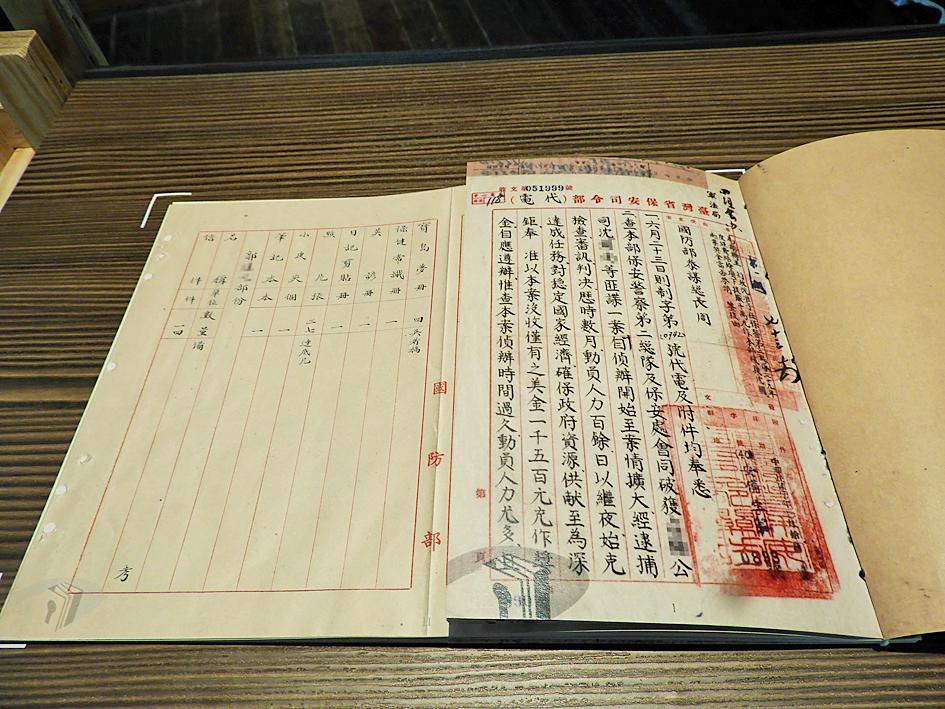The Transitional Justice Commission is drafting a bill that would return ill-gotten assets to the families of wealthy businesspeople and landowners whose assets were confiscated during the White Terror era, the commission said on Monday.
The properties of political prisoners, such as businessmen Huang Tien-liang (黃添樑) and Liu Chuan-ming (劉傳明), who were accused of helping the Chinese communists, accounted for 60 percent of assets confiscated by the then-Chinese Nationalist Party (KMT) government following the 228 Incident, it said.
A total of 177 people had their properties confiscated during the White Terror era, Formosan Political Prisoners’ Association honorary director-general Tsai Kuan-yu (蔡寬裕) said.

Photo: Chen Yu-fu, Taipei Times
Huang, former secretary-general of the Taiwan Federation of Commerce, was one of the biggest victims, and there was evidence that government agents had coveted his property, Tsai said.
The commission would submit a draft act this month, and would seek to compensate victims’ families either through the return of assets or monetary compensation, it said.
Confiscated assets were distributed by the KMT in four ways: They were added to the state treasury; given as rewards to those who filed reports incriminating others; given as rewards or expenditures to those who solved these cases; or — in the case of real-estate properties — used by government agencies or agents.
The commission looked at more than 500 cases of confiscated assets listed among records held by the Ministry of National Defense, including 300 that were only recently uncovered, it said.
The cases mainly involved people accused of breaching the Punishment of Rebellion Act (懲治叛亂條例), which has since been repealed, Tsai said, adding that some of the accused had no property that could be confiscated.
In 1949, Huang had gifted NT$3,000 to Taiwan Tribune cofounder Chen Chi-chang (陳其昌) to open a restaurant, but Chen instead lent the money to his colleague at the newspaper, Huang Pei-yi (黃培奕), Tsai said.
After Huang Pei-yi was tried as a communist spy, Huang Tien-liang was accused of aiding the communists.
There are still 188 real-estate properties confiscated during the White Terror era that remain in the government’s possession, Tsai said, adding that one of those is the now-abandoned Dingxing (鼎興) military barracks in Taipei’s Zhongshan District (中山).
The 3.2-hectare plot is one of the properties confiscated from Huang Tien-liang, he added.
Liu, another wealthy victim of political persecution during the White Terror era, was sentenced to 10 years in prison and had his various properties confiscated, after people he was associated with were accused of spreading communist propaganda.
In some of the cases victims had not even been given a trial before intelligence officials confiscated and occupied their property, Tsai said.
In his memoirs, former officer in the now-defunct Counterintelligence Bureau, Ku Cheng-wen (谷正文), said he had instructed officers arriving in Taiwan after fleeing China to take whatever properties they wanted as their own, Tsai said, adding that owners of property that officers wanted would be then arrested on fabricated charges.
Several examples of such cases remain to be further investigated, he said.

A group of Taiwanese-American and Tibetan-American students at Harvard University on Saturday disrupted Chinese Ambassador to the US Xie Feng’s (謝鋒) speech at the school, accusing him of being responsible for numerous human rights violations. Four students — two Taiwanese Americans and two from Tibet — held up banners inside a conference hall where Xie was delivering a speech at the opening ceremony of the Harvard Kennedy School China Conference 2024. In a video clip provided by the Coalition of Students Resisting the CCP (Chinese Communist Party), Taiwanese-American Cosette Wu (吳亭樺) and Tibetan-American Tsering Yangchen are seen holding banners that together read:

UNAWARE: Many people sit for long hours every day and eat unhealthy foods, putting them at greater risk of developing one of the ‘three highs,’ an expert said More than 30 percent of adults aged 40 or older who underwent a government-funded health exam were unaware they had at least one of the “three highs” — high blood pressure, high blood lipids or high blood sugar, the Health Promotion Administration (HPA) said yesterday. Among adults aged 40 or older who said they did not have any of the “three highs” before taking the health exam, more than 30 percent were found to have at least one of them, Adult Preventive Health Examination Service data from 2022 showed. People with long-term medical conditions such as hypertension or diabetes usually do not

POLICE INVESTIGATING: A man said he quit his job as a nurse at Taipei Tzu Chi Hospital as he had been ‘disgusted’ by the behavior of his colleagues A man yesterday morning wrote online that he had witnessed nurses taking photographs and touching anesthetized patients inappropriately in Taipei Tzu Chi Hospital’s operating theaters. The man surnamed Huang (黃) wrote on the Professional Technology Temple bulletin board that during his six-month stint as a nurse at the hospital, he had seen nurses taking pictures of patients, including of their private parts, after they were anesthetized. Some nurses had also touched patients inappropriately and children were among those photographed, he said. Huang said this “disgusted” him “so much” that “he felt the need to reveal these unethical acts in the operating theater

Heat advisories were in effect for nine administrative regions yesterday afternoon as warm southwesterly winds pushed temperatures above 38°C in parts of southern Taiwan, the Central Weather Administration (CWA) said. As of 3:30pm yesterday, Tainan’s Yujing District (玉井) had recorded the day’s highest temperature of 39.7°C, though the measurement will not be included in Taiwan’s official heat records since Yujing is an automatic rather than manually operated weather station, the CWA said. Highs recorded in other areas were 38.7°C in Kaohsiung’s Neimen District (內門), 38.2°C in Chiayi City and 38.1°C in Pingtung’s Sandimen Township (三地門), CWA data showed. The spell of scorching